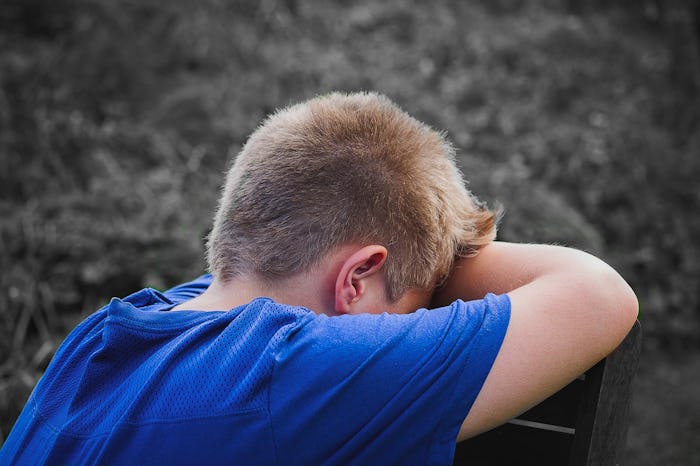Decoding a child's behavior can often be a difficult guessing game for parents. Young children often have a hard time expressing emotions, which makes behavior cues even more important to observe. If you've noticed your child has been increasingly withdrawn or irritable, you may want to be aware of the signs your kid is depressed, and not just sad.
An article in The New York Times Magazine suggested that depression can occur in children as young as 2 or 3 years old. And according to WebMD, research suggests that 1 in 10 kids will develop a depressive disorder by the age of 16.
If you or your partner have experienced depression, it is even more important to watch for signs that your children may be experiencing the same thing. According to Parenting, 25 percent of children who have a parent who has dealt with depression will experience depression themselves.
Depression and other mood disorders can manifest themselves in different ways, from chronic episodes to those that are brought on by seasonal and environmental changes. If you see more than one of these signs of depression in your child, it is important to seek help as soon as possible. But keep in mind that while depression is serious, with proper treatment, your child can live a happy and normal life.
1They Suffer From Low Self-Esteem
As hard as you try to make your child feel loved, depressed children can have feelings of inadequacy. According to A.D.D. Warehouse, children who suffer from depression often exhibit low self-esteem and feel unloved by those closest to them.
2They Change Their Eating Habits
When a child is depressed, you may notice a loss or increase in their appetite. According to the Anxiety and Depression Association of America, a change in your child's eating habits can be a symptom of depression.
3They Lose Interest In Activities
If you notice your child is becoming less interested in his favorite toys and activities, it could be a sign of a larger issues. The American Academy of Child and Adolescent Psychiatry noted that showing a decreased interest in things that were once fun could be a sign of depression.
4They Are Always Tire
When your normally active child has little energy to play outside, you should be concerned. Depressed children generally have low energy, and prefer watching television on the couch to playing outside with friends or siblings, according to the website, A.D.D. Warehouse.
5They Cry A Lot
As mentioned on Everyday Health, a child who cries more than normal — even at little things — can be having difficulty dealing with their emotions and may need some help processing their feelings.
6They Are Irritable
We all have bad days, but if your child is increasingly irritable, you may want to take notice. Although most young children experience the occasional meltdown, children who are constantly on edge could be experiencing depression, according to the Cleveland Clinic.
7They Are Sad. . . A Lot
A child who gets sad or comes down easily on themselves when they are unable to complete tasks or makes a mistake, is often struggling with their emotions. Excessive sadness is a sign of depression in children, according to WebMD.
8They Avoid Interactions With Others
At first glance, a child who avoids interaction with others may be labeled as shy, but according to Psych Central, children who are increasingly withdrawn may be suffering from depression.
9They Experience Frequent Aches And Pains
If you find yourself making frequent trips to the pediatrician, only to be sent home without an actual diagnosis, something bigger may be happening. According to Everyday Health, chronic headaches and stomach pains without a substantiated physical illness can be a sign of depression.
10Their Sleep Habits Change
Has your child been sleeping more or less than what you consider normal? Chances are it could be a sign of a bigger issue. According to the Cleveland Clinic, changes in your child's sleep patterns can be a symptom of depression.
11They Cause Trouble At School
If you are the parent of the class clown, your child may be trying to tell you something. According to the American Academy of Child and Adolescent Psychology, children who exhibit disruptive behavior at home or school are often depressed.
